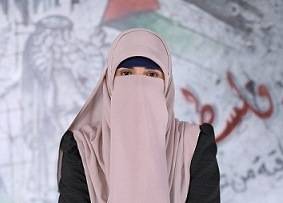“After six years, I only felt freedom when I heard the word ‘Mama’ from my little son, who I left when he was only eight months old,” says mother of seven Nisreen Abu Kamil, who was released from the Israeli occupation’s prisons on 17 October.
My biggest fear was that Ahmad would not recognise me or love me, but I was over the moon when he called me Mama and hugged me.
Nisreen was detained in October 2015 and sentenced to six years. At the time, her eldest daughter was just 11 years old. Israeli occupation authorities prevented her children from visiting her in detention.
“Throughout these long years, I had no chance to see or even call my family except twice,” Nisreen says. The visitation system in Israeli jails is stressful and humiliating, she explains, both for the detainee and their family.
“I would die a thousand deaths and be emotionally drained each time they would announce family visitation because my family were not allowed to visit me.”
Amira, Nisreen’s eldest daughter who is now 17, says: “For six years, I only knew my mother through old photos of her. I’ve waited for this moment for so long.”
article continues after video
READ: After 91 days on hunger strike, Palestinian prisoner’s health worsens
In her mother’s absence, Amira took on the responsibility of caring for her siblings. “The most challenging thing for me was my eight-month-old brother who I had no idea how to take care for, and how to study along with caring for him,” Amira explains.
Nisreen was arrested at the Beit Hanoun checkpoint in the northern Gaza Strip in 2015 after receiving a phone call from Israeli occupation intelligence summoning her to the checkpoint to obtain her husband’s permit to visit her family in Haifa later that month.
As soon as she arrived at the checkpoint, she was ambushed by occupation forces who placed her in an interrogation room. She was subjected to harsh interrogation for 31 days in Ashkelon prison.
She was hit with rifle butts directly on her chest and was later transferred to Hasharon Prison for about 90 days before being transferred to Damon prison until her release.
Nisreen describes the prisons as worse than hell.
“The majority of the rooms are poorly ventilated, humid and infested with insects. The building is old and humid. There are no chairs in the rooms, and the prison administration prevents the women from covering the floor with blankets,” she says.
“Each room has a water heater, an electric stove, a TV, a radio, and an open toilet. The beds are bunk beds, leading to accidents as women fall from the beds, sometimes resulting in fractures.” Nisreen herself was injured this way. “I once fell and had my arm broken, and it needed a plaster cast, but they refused to treat me.”
READ: Prominent writer among ten Palestinians arrested by Israel in West Bank raids
She describes the drinking water as contaminated, forcing prisoners to buy mineral water from the prison canteen.
The courtyard is not covered, so when it rains, or the weather is very hot, the women are unable to benefit from the few moments of fresh air they are allowed.
After her release, Israeli occupation authorities forced Nisreen, who is a Palestinian citizen of Israel, to sign an agreement banning her from travelling between Gaza and the occupied West Bank for two years.

Freed Palestinian prisoner Nisreen Abu Kamil’s children hold a sign that reads ‘Mum is metres away from us’ as they wait for Israeli occupation authorities to allow her into Gaza, 18 October 2021 [Mustafa Hassona/Anadolu Agency]
Nisreen spent her first night outside the prison walls in an open area near the Beit Hanoun (Erez) crossing waiting for permission to enter Gaza. Her family was waiting for her on the other side. For three days, her husband and their seven children, relatives, friends and supporters stationed themselves on the Palestinian side of the crossing, hopeful of her arrival.
Those three days, she says, were “heavy and painful”. “I was a few metres away from my children, and I could not see and embrace them after years of separation.”

![Released by Israel on after serving six years in prison, freed Palestinian prisoner Nisreen Abu Kamil awaits permission to enter the Gaza Strip, in Hebron, West Bank on 18 October 2021 [Hisham K. K. Abu Shaqra/Anadolu Agency]](https://i0.wp.com/www.middleeastmonitor.com/wp-content/uploads/2021/10/2021_10-22-Nisreen-Abu-Kamil-2.jpg?fit=920%2C613&ssl=1)







